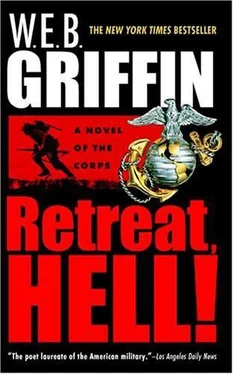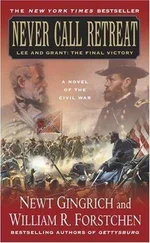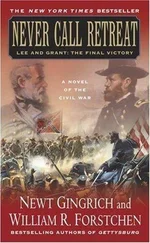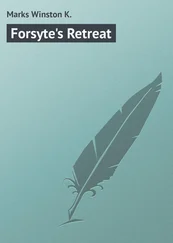At Camp Drake, he was assigned to the 7th Division. When he got there, they didn't seem to know what to do with him. He was given one assignment after another—one of them lasting six hours—but finally he found himself in the 27th Infantry Regiment. There the colonel commanding—who looked smart and competent, if harried—took a sixty-second look at Jack's service record.
Jesus Christ, he thought, they finally sent me a company commander who's been in combat.
Then he said: "Congratulations, Captain Allen, you are now commanding officer of Charley Company."
When Allen found his new command, in a battered frame barracks building, the acting first sergeant—a technical sergeant who a week before had been running an NCO club—told him Charley Company's total strength was two officers and twenty-six enlisted men—plus thirteen enlisted men listed as "absent, in confinement." The other officer was Second Lieutenant C. Danton Foster IV, who looked to be about nineteen but who told Allen he had graduated just over a year before from West Point. When Allen looked at Foster's service record, he saw that he was unmarried and listed his next of kin as Major General C. Danton Foster III.
Charley Company's ranks were soon filled out. Among the first "fillers" to arrive the next day was First Sergeant Homer Grass, a beer-bellied regular from West Virginia. It took Captain Allen and Sergeant Grass—who wore the "Bloody Bucket" of the 28th Infantry Division on his right shoulder and the Combat Infantry Badge on his chest—about ninety seconds to judge the other, assess the situation, and conclude that they were both in the deep shit and unless they could fix things in a hurry, they were liable to get killed.
When the next group of fillers appeared—the thirteen just-pardoned malefactors from the Tokyo stockade still wearing fatigues with a large P painted on the back—resisting despair had been difficult.
Neither did Charley Company have much in the way of equipment to boast of. They had nowhere near the numbers of individual items prescribed by the Table of Organization & Equipment, and what they did have was in lousy shape—in the case of several bundles of blankets, literally lousy.
Second Lieutenant C. Danton Foster IV—who had immediately become dubbed "Foster Four"—proved far more useful than either Jack Allen or Homer Grass expected. The three other officer fillers, all lieutenants, however, ranged from mediocre to awful, and none had ever heard a shot fired in anger.
Surprising Jack Allen, none of the filler officers ran to the Inspector General when he announced at Officers' Call that seniority regulations be damned, Foster Four was his Exec, and when Foster Four said something, it was to be treated as if he himself had said it.
As the enlisted fillers dribbled in, Jack Allen adopted, with Grass's and Foster Four's approval, a training philosophy of first things first. Everybody fired both his individual weapon and then the .45 pistol, staying on the firing range until they achieved a basic skill. Then they learned to fire—more important, to service—the Browning automatic rifles, the .30- and .50-caliber machine guns, and the mortars. Soon Grass had them throwing grenades and attacking sandbags with bayonets and entrenching tools.
Some of the fillers were noncoms. Charley Company got a good supply sergeant—a blessing—and an incredibly bad mess sergeant. The company needed three really good platoon sergeants. It got one, with War Two credentials on a par with Grass's, and two who had never heard a shot fired in anger.
Charley Company was almost at authorized strength when they boarded the transport at Sasebo, and before they got into the landing barges at Inchon it was actually overstrength.
Allen thought privately, and more than a little bitterly, that someone knew that poorly trained troops were going to take heavy losses, so they were sending in replacements early.
But after they got ashore, the 1st Battalion went into Division Reserve. They weren't needed and weren't used. It was either the exigencies of the service or the kindness of a merciful God, but Charley Company was not thrown into combat.
It had been, however, subject to personnel levies from division headquarters, ordered to transfer officers and men elsewhere within the division to fill vacancies created by combat. While he hated to lose the men he had trained— it was possible, if not likely, that the reserve would be called to combat—this did provide Allen with the opportunity to get rid of most of the pardoned prisoners, the mess sergeant, and all of the lieutenants except Foster Four.
Before long, Charley Company was down to not many more people than it had had when he assumed command.
Then the battalion was given the mission of setting up roadblocks south of Seoul, and Charley Company and its two officers and fifty-two enlisted men were given the mission of establishing one south of Suwon.
Their mission was to prevent North Korean troops being forced back up the peninsula by the advancing Eighth Army from getting any farther north.
As soon as the trucks dropped them off, Allen had let it be known that they could expect to see the enemy any minute. That had the desired result of energetic position building and foxhole digging.
Then Allen sent First Sergeant Grass and the supply sergeant on a scrounging mission for ammunition of all kinds. When the enemy finally did appear, he wanted his peacetime soldiers to have as much experience in actually firing their weapons as possible. And the chance to replace what weapons that were going to fail.
Then he went to Regiment himself and begged the S-3 for tanks to reinforce the roadblock. He argued that not only was Charley Company way understrength, but that the Shermans of the Regimental Tank Company weren't being used at the moment. He made it clear that he understood that when the enemy finally showed up and the tanks were needed elsewhere, he would have to give them up.
If the Regimental Three believed that, fine. Allen thought it was highly probable that if the enemy showed up and he was using the tanks, and then came a radio message ordering them elsewhere, that message would be garbled beyond his understanding.
The tankers—under the command of a young second lieutenant, a West Point classmate of Foster Four—surprised Jack Allen. They were well trained and welcomed the chance to practice-fire their tubes at maximum range directly down the road. And one of the tank sergeants was a mortar expert and soon had Allen's mortar crews accurately laying their fire on the reverse sides of the slopes lining both sides of the valley.
After a few days, Captain Allen was confident that his men could deliver fire where it probably would be needed—and, as important, that they had the confidence they could.
Allen, Grass, and Foster Four were feeling pretty smug about what they had accomplished when an asshole from division headquarters showed up. He introduced himself as Major Alfred D. Masters and said he was the assistant Division G-2.
He was a natty little Regular Army bastard in shiny boots, a nonregulation zipper jacket, and a scarf made from camouflage parachute silk around his neck. He carried both a .45 in a tanker's shoulder holster and a .45 ACP Grease Gun. If he had earned a Combat Infantry Badge, he hadn't sewn it to his fancy jacket.
He had come, he said, to place Charley Company on the alert for "a reconnaissance patrol possibly operating south of these coordinates."
Allen thought there wasn't much useful information in that . . .
What does "possibly" mean? Is there a patrol or not?
Whose patrol? How big a patrol?
What am I supposed to do if the patrol shows up?
Читать дальше












